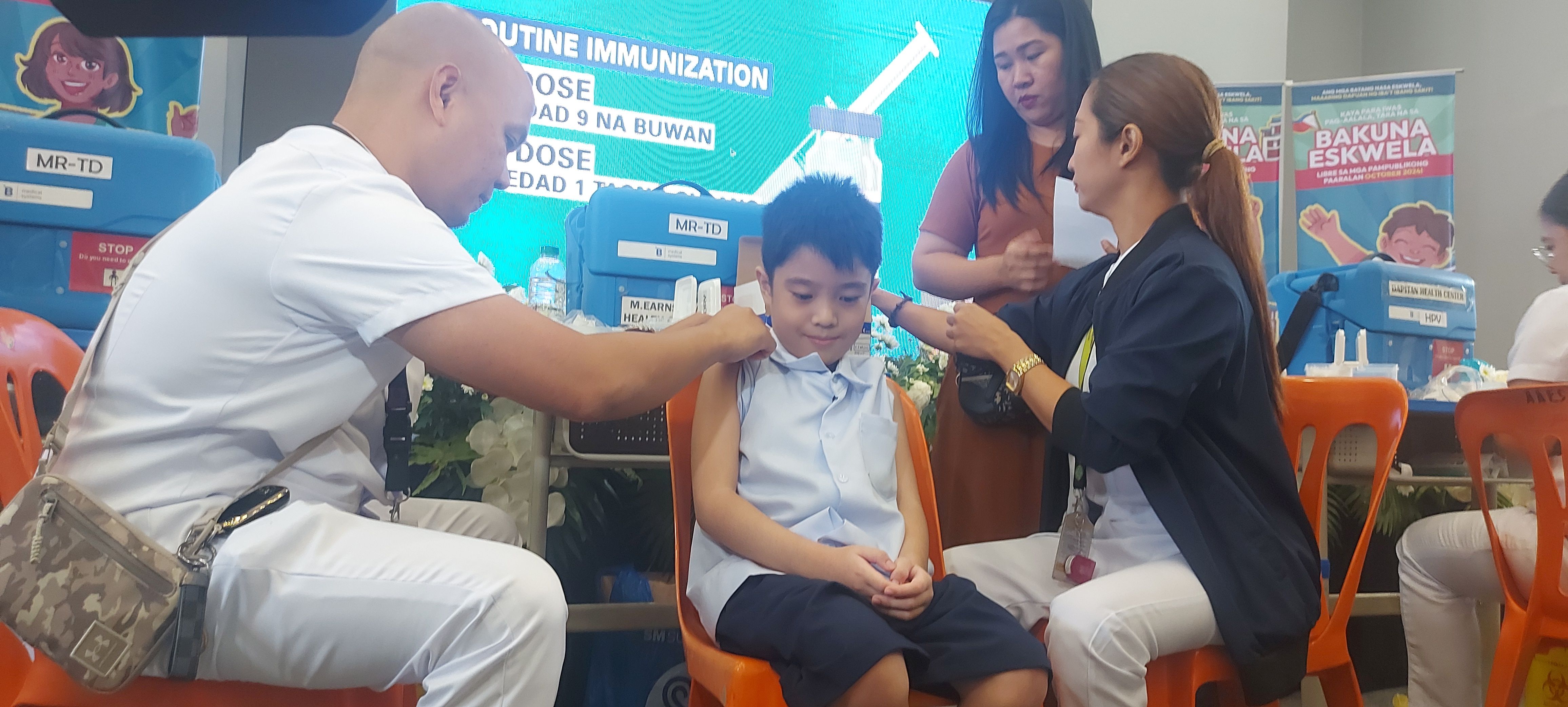'Give consent': DOH urges parents to support school-based immunization program
Department of Health (DOH) Secretary Teodoro Herbosa on Monday, Oct. 7, urged parents to give their consent so their children can participate in the “Bakuna Eskwela” program in public schools.

“Ang panagawan ko sa mga magulang, magbigay ng consent sa kanilang mga anak sa public schools at sana yung mga parents, pirmahan yung forms (My request to the parents is to give consent for their children in public schools, and I hope that the parents will sign the forms),” Herbosa said on the sidelines of the “Bakuna Eskwela” launch at the Dr. A. Albert Elementary School in Manila.
The “Bakuna Eskwela” is a joint vaccination initiative of DOH and DepEd to protect school-age children against measles, rubella, tetanus, diphtheria (MR, Td), and human papillomavirus (HPV).
Also known as the School-Based Immunization (SBI) program, the “Bakuna Eskwela” will run for two months—October and November—and will be conducted every Friday in select schools.
DepEd and DOH launched the “Bakuna Eskwela” to protect students from life-threatening vaccine-preventable diseases (VPDs).
The launch of the “Bakuna Eskwela” also marked the revival of the SBI after a four-year suspension due to the COVID-19 pandemic.
Herbosa said the program is also in partnership with local government units (LGUs).
Addressing vaccine hesitancy
Herbosa noted that one of the challenges in implementing the SBI is the hesitancy among parents to give their consent.
“Kinukumbinse naman namin. Ang maganda sa school-based, alam namin yung mga batang hindi nabakunahan. So over the next two months, may schedule iyan na pupuntahan at kakausapin ng aming mga teams (We are also convincing them. The good thing about school-based programs is that we know which children are unvaccinated. So, over the next two months, there will be a schedule for our teams to visit and talk to them),” Herbosa said.
Herbosa noted that there are various reasons why parents are hesitant to have their children vaccinated. “Iba’t-iba ang rason, karamihan, takot sa side effects, naloloko sa social media (There are various reasons; for the most part, they are afraid of side effects and are misled by social media),” he explained. As DepEd and DOH resumed their SBI initiative, Herbosa reiterated that vaccines could save children's lives.
“Itong mga bakuna na ito, dating bakuna na ito at ito ay talagang safe at very minimal ang side effects (These vaccines are the same ones that were previously used, and they are really safe with very minimal side effects),” he added.
Before the launch of the “Bakuna Eskwela,” Herbosa said DOH already held a forum with the help of teachers to explain to parents why their children need to be vaccinated and what vaccines would be administered.
Herbosa said DOH is targeting to cover at least five million school-age children through the “Bakuna Eskwela” campaign.
READ:
https://mb.com.ph/2024/10/7/bakuna-eskwela-launched-in-public-schools
Stronger information dissemination
Recognizing that vaccine hesitancy remains a challenge in the implementation of SBI, DepEd Secretary Sonny Angara underscored the importance of information dissemination.
“Ang bakuna, kaligtasan iyan, buhay iyan. Yung mga hindi nagpa-bakuna, talagang malala yung pwedeng mangyari dun sa mga bata (Vaccination is about safety; it is about protecting lives. For those who do not get vaccinated, the consequences for the children can be severe),” Angara said.
“In extreme cases, pwedeng mamamatay ang bata pag walang bakuna. So talagang dapat seryosohin ito (In extreme cases, a child could die without vaccination. So this really needs to be taken seriously),” he added.
Angara noted that vaccine willingness among Filipinos remains at 40 percent, down from 90 percent before the Dengvaxia incident. “Malaki pa din ang vaccine hesitancy at hindi pa tayo nagre-recover (Vaccine hesitancy is still significant, and we have not yet recovered),” he added.
“Talagang information dissemination para yung mga ‘Marites’ hindi mapakinggan at ang mapakinggan ay yung mga eksperto (It's really about information dissemination so that the 'Marites' (gossipers) are not listened to, and what is heard are the experts),” Angara said.
“May effort talaga ang DepEd to talk to the parents and inform them kung ano ang pwedeng mangyari kapag hindi nagpabakuna ang mga anak nila (The DepEd is really making an effort to talk to the parents and inform them about what could happen if their children do not get vaccinated),” he added.
Vaccine awareness
Meanwhile, parents shared the importance of participating in school-based immunization.
Karen Bulseco allowed her 9-year-old pupil to be vaccinated against HPV. She decided to participate in the SBI after her sister died of cervical cancer at 32 years old.
“Sobrang halaga para sa akin nung vaccine (The vaccine is very important for me),” she added.
Jennifer Ambos, 34, a BPO employee, also allowed her Grade 1 son, Ethan Zane Derama, to be vaccinated against measles, rubella, tetanus, and diphtheria.
“Since bata pa siya, yung ganyan na vaccination is talagang active magpabakuna kasi bukod sa libre, nakakatulong siya at hindi na dagdag sa gastos kasi mahirap ang bata kapag nagkasakit kaya active ako sa mga ganitong programa (Since he was young, we’ve always been proactive about vaccinations because, aside from being free, it helps a lot and prevents additional expenses. It's difficult when a child gets sick, so I'm very active in these kinds of programs),” she added.
The “Bakuna Eskwela” campaign will be rolled out in selected public schools across various provinces this October to November 2024.
RELATED STORY:
https://mb.com.ph/2024/10/5/doh-dep-ed-to-kick-off-bakuna-eskwela